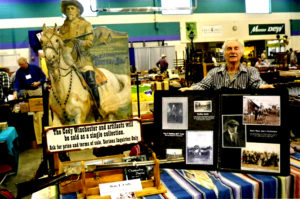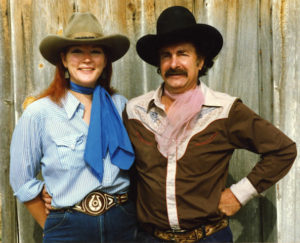Read about Beau Hickory’s Wild-West-Show past and find out why he wants to sell a rifle that he says belonged to Buffalo Bill.
Working at the “Premier Magazine of the West” has its perks — one of them being the constant stream of interesting packages we receive at our Dallas office. On any given day, we might be treated to advance copies of anticipated western page-turners, small samplings of craft beverages, and, of course, early looks at the latest and greatest fashions. But even more cherished are the thoughtful letters we receive from loyal readers who tell us how our stories struck them (both positively and negatively) or who just want to say how much they love the magazine.
A few months ago, I arrived at work one morning to find a giant cardboard box blocking my doorway. You can imagine the warmth I felt as I opened the box and saw a branding iron and a handmade wooden hat rack. The enclosed letter was from 87-year-old Arizonan Beau Hickory, who, I quickly discovered, had made a name for himself for decades in the West as a top-tier trick shot and showman.
Mr. Hickory had written to me about his Wild West-show exploits with his wife, Tinnell — a life of “trick roping, precision whip cracking, trick animals, and theater.”
The lump in my throat got bigger as I reached the end of the note: “With age, I have learned that while there is a time in life for acquisition, late in life there comes the time for passing things of importance on to others. With this philosophy in mind, I believe it is time to pass the Flying H brand on. ... Whether his place of business is on the range, or in an office, every cowboy should have his own brand, and a place to hang his hat and gun belt.”
As soon as I could gather myself, I gave Mr. Hickory a call to thank him. We’ve had more than a few enlightening conversations since. I’ve heard many more stories about his family’s history of trick shooting and old-school showmanship. And he’s also told me about another heirloom item of his that might be of interest to serious Western collectors: an 1873 Winchester that he says was a gift to his family in 1913 from none other than Col. William Frederick “Buffalo Bill” Cody.
Read more from one of our chats with Mr. Hickory below, and contact him if you want to know more about that Cody gun.

Cowboys & Indians: If you don’t mind, I’d like to start with your lineage, how you came into the world of trick shooting and Wild West show performance. I know your dad was very accomplished in this area. Tell me how he got you interested.
Beau Hickory: My father started pretty early in show business. Dudley Smith, an uncle of his and great uncle of mine, was with the Buffalo Bill show. He rode bucking horses in the arena ... Family stories are that he did a little bit of service on the guns that they had. My father met him in 1913 after the show closed up, and he gave my father a single-action Colt that he used in the Wild West Show. That started my father down the line of gun collecting. ... In any event, my father did tour the whole United States doing an act very similar to what Will Rogers had left when he got big on Broadway. He did trick roping and Western philosophy. ... I got started in the Wild West Show business in rodeo because my father was an excellent announcer, and he announced the show, and he’d do trick roping and aerial trick shooting. As soon as I could walk, I had a handful of trick ropes. In any event, that’s how I got started. ... I started packing iron when I was 3½. You have no idea how hard it is to hide a revolver in a sun suit. I’d go down to the beach and shoot.
C&I: Did you feel like you had a sense, even at that young age, as to how to be safe with it and how to not hurt yourself?
Hickory: Oh yes. That was very well taught to me as to how to do that. In any event, I was more on my own than most little kids.
C&I: When did you get a bug for performing in front of people and kind of making it into a show, rather than just taking up competitive shooting?
Hickory: I have done show-type shooting since I was about eight. My father and I did a little bit of performance together, me throwing targets and him shooting them. ... Later I did rodeos. Rodeo has changed so vastly now that I don’t even attend them anymore, because they’re no fun. When I was a kid, rodeos were family entertainment. Now they’re a high-class competition, and people get hurt.
C&I: What other kinds of shows and exhibitions did you find yourself doing?
Hickory: I shot on stage. We’ve done school shows. I think I shot in almost every school yard in the city of San Francisco. I would take a collection of antique guns for these kids to be able to actually handle, and I have stacks of letters that they would write to me after the show.

C&I: How many years would you say that this was going strong? And is there still any remnant of it in society today that people can get into?
Hickory: Well, I just know I’m too old now to go and do performances. Because to go and do a shooting act, one of the reasons it’s not done anymore is because of the cost of it. You need a truck and a trailer, and you need saddles, and you need two or three horses. When I would walk into an arena to shoot, I would have probably close to $20,000 of guns with us. Because you have to have backups. If something goes wrong, you've got to be able to cover for it.
C&I: I know you’ve been wanting to tell us more about a Buffalo Bill Cody 1873 Winchester rifle that you have in your possession. Can you tell us how it came to your family?
Hickory: After the Buffalo Bill Show closed up in 1913, Dudley Smith gave the gun to my father sometime in the late teens. My father, I didn’t know he had it. This is a very strange thing. He kept it at his brother’s house; not with our gun collection. My father had knowledge about a number of very famous weapons like Cody’s. When I asked my father about Cody’s Winchester, he said, “Yeah. It’s a ’73 like the one I shoot. However, it has a round barrel instead of an octagon barrel, and his gun was nickel-plated, not chrome.” I have documentation and photographic provenance of the four generations of trick shots who have owned and used the rifle: Cody himself; Dudley Smith; my father; and myself and my wife, Tinnell. There’s no question about what it is.
C&I: But now you are looking for someone to take it off your hands?
Hickory: Yeah. Because at this point in our lives, we don't want to die and somebody not know what this is. We’re at a point where we need to retire, and we want to find a home for the gun. If you get halfway smart when you get old, you start finding homes for things that belong to you, that mean something to you, and you find somebody that they mean something to also. We’re at a point where we need to retire, and we want to find a home for the gun and hopefully someone that could help us a little bit with the retirement on it.
Beau Hickory can be reached during daytime hours at 928.636.2482.













